The Independence-variant littoral combat ship USS Gabrielle Giffords successfully demonstrated the capabilities of the Naval Strike Missile (NSM) during Exercise Pacific Griffin.
The US Navy say that Pacific Griffin is a biennial exercise conducted in the waters near Guam aimed at enhancing combined proficiency at sea while strengthening relationships between the U.S. and Republic of Singapore navies.
“Today was a terrific accomplishment for USS Gabrielle Giffords crew and the Navy’s LCS class” said Cmdr. Matthew Lehmann, commanding officer.
“I am very proud of all the teamwork that led to the successful launch of the NSM.”
The NSM is a long-range, precision strike weapon that can find and destroy enemy ships at distances up to 100 nautical miles away. The stealthy missile flies at sea-skimming altitude, has terrain-following capability and uses an advanced seeker for precise targeting in challenging conditions.
Rear Adm. Joey Tynch, commander, Logistics Group Western Pacific, said in a release:
“LCS packs a punch and gives potential adversaries another reason to stay awake at night,” Tynch said. “We are stronger when we sail together with our friends and partners, and LCS is an important addition to the lineup.”
The weapon was first demonstrated on littoral combat ship USS Coronado in 2014.



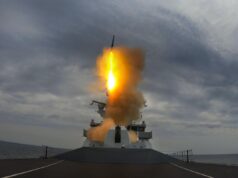
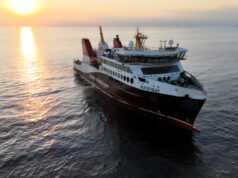
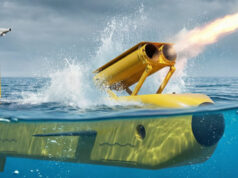
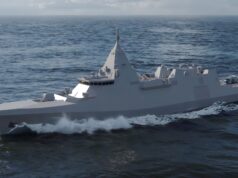
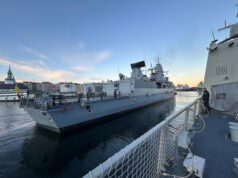
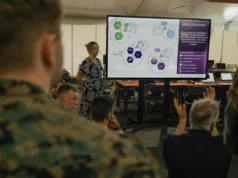

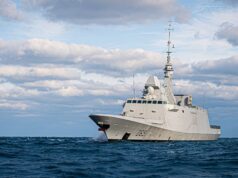
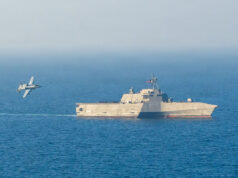
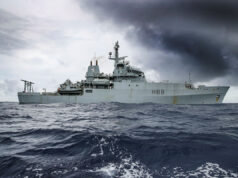

RN needs this now as the Harpoon replacement, to be installed on Daring T45 Destroyers, T23, T26 and T31 Frigates.
Proven capability, compatible stocks with US, Norway and others. Stop dithering MOD and do it.
I believe the RN has a stated requirement for a AshM with some ground attack capability which, if true, will mean we are likely to get the Saab RB15 on some ships. Expect a very limited order of missiles and launchers while we wait for T26, its VLS, and Perseus.
The NSM has a very capable land attack option as well. This led to the joint strike missile which is a more multi-purpose weapon.
Aren’t they two different missiles though? It sounds as though the RN want one missile on their ships that can also hit land targets.
https://www.savetheroyalnavy.org/more-details-emerge-about-plan-to-replace-royal-navy-harpoon-anti-ship-missile/
This was my source.
I think that HM government has rather a lot on its plate at the moment. With all these promises of jam today, Boris will probably not want to commit to defence spending where there isn’t any electoral advantage!
I’m not sure I haven’t stumbled across something. Listen to this video from about 3 weeks ago with a Raytheon guy talking about NSM/JSM …
https://www.youtube.com/watch?v=Ttn1iUQRliU
For the impatient, skip to time index 5:30 at which point they are discussing NSM/JSM and the Raytheon guy says…
“The leverage we enjoy from the Naval Strike Missile to pass those savings on not only to the domestic war fighter in the United States but also our U …. our international partners”
Is it just me or does he almost say “our UK partners” before correcting himself? He pretty clearly (to my ears) was about to say something starting with U and I get the impression that after saying the “U” he was in the process of forming a hard “K”.
The guy is the executive for business development at the missile division so maybe Raytheon/Kongsberg are much further down the road in negotiations with the UK than might be public knowledge (down-selected & negotiating final Ts & Cs?) hence the Raytheon guy’s head might have been very preoccupied with the UK as the international partner for NSM. Or maybe I’m clutching at straws (again!)
I have listened to it a few times now. You might be right but I’m not sure it is that clear TBH.
Given the relative short range and payload of the NSM when compared to Harpoon and RB15, I’m not sure it is the best option for a blue water navy. That said, if the USN’s buying power mean we can get more systems to fit them to more ships then it could be worth it.
Important point while that missile and range would be a decent fit for a littoral ship which is not expected to engage blue water adversaries but has a last ditch defence should it unexpectedly do so and has some close to land protection in its normal role, it is arguable whether it would be a worthwhile ten year fit for supposedly open ocean warships which would expect to combat such adversaries in a conflict, especially with the developments ‘promised’ by some of those potential adversaries likely over that period.
That said one can see the MOD seeing it as a good enough option and not wanting to go overboard when a long term solution is in the works Though how long term we will have to see considering even as planned it will be a decade. As the powers that be seem to have at times considered no missiles at all as an acceptable ‘compromise’ then one can hardly think they wouldn’t based on mere performance reject this option. One can see the ‘good enough for the US blah blah excuse being used’ without as usual fully pointing out the very pertinent differences in that use.
My understanding is the USN does not want the littoral vessels but congress keeps awarding funding to build them .
It has taken years to find a role for the freedom and independence class littoral ships and they failed in many of the scenarios they where designed for.
A classic example of American pork barrel politics building 24 vessels that the navy dose not want and don’t work .
LCS units actually work fairly well with only two, actual breakdowns (USS Fort Worth and USS Milwaukee) with other reported “problems” being no different than the ones any Navy sees day to day. The only difference is that LCS system issues got coverage where those of the DDG 51 and other classes did not.
Cough…Cough…
I work with USN staff who have worked on LCS .
LCS is an unmitigated disaster.
It is now 3-4 years since the first vessels should have been working in the Gulf region , they are still not here and that date keeps going right.
Regarding NSM its light on the warhead. The recent Sinkex where NSM was shot did not produce any kill shots against the OHP target vessel. In the end it needed a sub launched torpedo to break the vessels back to get it to sink.
Its better than nothing but its not a cure all.
“Worked on LCS” covers a wide territory and time going back to the early 2000’s when the LCS program had significant issues. That has not been the case since the program was put under PEO leadership in 2012. LCS is not a traditional USN combatant in that it does not deploy with a unitary crew. LCS needed to have a decent number of commissioned units and enough trained rotational crews to deploy them in numbers to more than one geographic area. Congress consistently failed to fund what the Navy asked for terms of LCS and they are to “blame” more than any other entity.
Mission kill is more important than physical kill and one NSM is more than enough to mission kill a Perry class FFG. One such weapon was enough for Sheffield in 1982 and Stark in 1987; two hits there was just gratuitous destruction in one area but one hit was enough. I wonder how “survivable” people would think the FFG 7 had the damage that occurred to Stark and later to Roberts in a geographic area more like that of the Falklands than the relatively placid Persian Gulf?
Working on LCS from my perspective is the Engineering Support. the original concept of base support periods using contractors has rightly been identified as a major issue. It would have been a cash cow for defence contractors who would fly in to the operating base area to do things such as change an air filter.That has now changed but it still requires work.
The variant which will eventually arrive in the Gulf will provide a step change in capability when compared to the existing 5 fleet vessels. However it again comes down to engineering support ca[abilities. The propulsion system is the weak link and it requires a lot of dedicated work to ensure it stays available. The crews onboard will not be able to do it. It will come down to base support and that is the weak link.
You mention T42 and Stark. These are not modern warships.Post Falklands the RN invested heavily in lessons learned. Federated systems, decentralised firemain, HP Air systems, better DC and FF. The resultant T23 and latterly T45 are completely different beasts and far more capable of surviving and fighting on post a missile hit.
Regarding Sheffield, the Exocet has a 160+Kg warhead plus a solid propellant rocket motor. The combination of warhead and propellant caused many of the issues with fire and smoke .
An NSM warhead is smaller by some 50kg and uses a jet fuel powered engine. The resultant damage from a hit though severe will not be of the same magnitude as an Exocet.
Just read the latest report for the Pentagon from the Inspector General and the report states that no more LCS should be built or commissioned and the ones in service should be disposed of as they are not fit for the purpose they where designed for.
The navy definitely does not want them only congress wanted them .
$30 billion for 35 ships , non of which have ever been deployed . 16 have been commissioned 6 are used as training ships 4 are test ships leaving 6 available to deploy . 19 are building and can’t be cancelled due to how the funding was allocated by Congress.
The budget for the modules has been cut , they have ongoing engine problems that make the type 45 inter cooler issue like a minor hiccup and the twin hull design has cracking issues.
The navy hopes to deploy 2 in 2020 but they where meant to deploy in 2018,2019 but the date keeps slipping.
Pork barrel politics at it’s worse.
In 2017 they launched one ( Little Rock) that had to transit from the Ship Yard in the mid west through the Great Lakes to the Atlantic before sailing to its home port in Florida. Unfortunately it had issues and stopped in Montreal for repairs.In Montreal it got iced in and was stuck there for 3 months .
Was that Kent Brockman interviewing him.
I think it might be a good idea to work on equipping Merlin with Spear 3. The helo could fly a couple of hundred km and then release 6 or 8 of them. The missiles would fly the last 80 km under their own power. Hey presto – 280 km swarm anti-ship capability.
RBS15 looks as if it has zero stealth characteristics, therefore will be detected and defeated.
The NSM on the other hand looks as if it does but a smaller warhead.
My opinion is the NSM would prove to be a better option, but given the current state of RN anything would be better than nothing.
Both missiles can attack land targets as well a shipping. However, there are two fundamental differences between the missiles. The RBS-15 should be compared to the current Harpoon and Exocet, it is designed to kill ships like frigates and destroyers. The NSM/JSM due to its smaller size is not.
The RBS15 is radar guided, it can operate in the passive RF seeker mode, but is primarily designed to use its radar actively to search for and track targets. This makes it more detectable when using electronic surveillance from either the ship or its aircraft. It also makes it more susceptible to electronic countermeasures such as active or passive jamming.
The NSM/JSM on the other hand uses a passive imaging infra-red (IIR) seeker as its primary method of searching for a target. A 2D picture of the target is used as a reference that can be uploaded prior to launch or uploaded via the two way data-link. This reference picture is then used by the missile to compare the image that the IIR sensor is seeing to make sure its the correct target. The RBS-15’s radar will produce a radar image of the target, but it won’t be as detailed as the NSM/JSM’s. Therefore, it is easier for the RBS-15 to mistake one ship for another and hit the wrong target. With NSM/JSM, it can be programmed to attack specific parts of a ship. This means it can do a surgical strike on a bridge, primary radar, weapons launcher, hangar, engine room etc. So even though it has a smaller warhead it can inflict significant damage to take the targeted ship out of the fight or being able to contribute to a defensive screen.
They have designed the NSM/JSM to have a very low frontal RCS compared to RBS-15. This will make it more difficult for ship to initially detect the approaching missile. It may be subsonic, but it is highly manoeuvrable and performs high G jinking as it gets closer to the ship, making it even harder to counter.
It is a multi-purpose weapon and is more than capable of hitting targets on land. It has even hit moving vehicle targets during trials. If there was a conflict against another peer ship. Therefore, even though the missile carries a smaller warhead than Harpoon or RBS-15. The NSM/JSM can be launched in numbers to hit key areas on an enemy ship, to take it out of the fight. The combination of built in RF stealth and a passive IIR sensor, will make it much harder to detect or use countermeasures to spoof it. In today’s age where positive target identification is required, the NSM/JSM is the obvious choice.